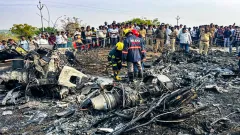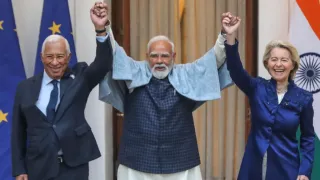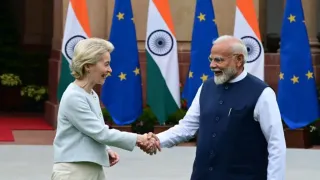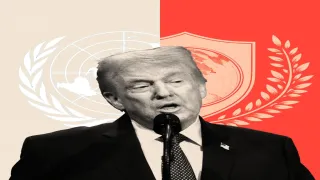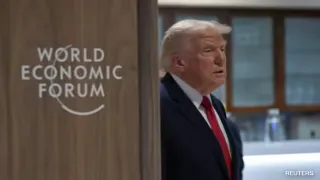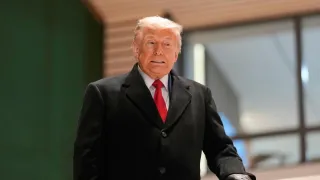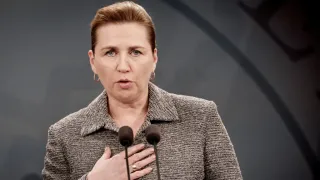In the wake of a tense national climate and rising global anxieties, a new wave of debate has ignited across the United States. The atmosphere has become especially charged following a recent incident in Washington, where a shooter approached two National Guard troopers and opened fire at close range. The tragic event, which claimed the life of one young trooper and left another critically injured, has added further intensity to an already divisive political moment. Against this backdrop, the US government has unveiled one of its most sweeping and controversial immigration directives in recent history.
The announcement, made by President Donald Trump, declared a permanent pause on migration from all so-called "Third World Countries." This move, coming just days after the Washington shooting, has been framed as a step intended to protect national security and stabilize a system that officials claim has been stretched thin. Though strongly supported by some, it has triggered criticism and deep concern among global experts, humanitarian groups, policy analysts, and millions of immigrants seeking opportunities in the United States.
As discussion grows, the decision is being examined not only for its domestic impact but also for its potential to reshape America’s relationship with international communities. With migration being a cornerstone of the nation’s demographic growth, innovation, and cultural diversity, the long-term effects of such a pause are likely to be profound. This announcement also coincides with heightened scrutiny of security measures and federal responsibilities following the shooting that shocked the capital.
US Announces Permanent Pause on Migration
President Trump’s declaration has been positioned as a response to what he described as an “overstressed system,” citing the need to restore order and tighten protocols. In his statement, he emphasized that migration from countries classified under the “Third World” label would be halted indefinitely. The announcement referenced concerns over unlawful admissions, national security risks, and alleged exploitation of federal benefits.
According to the administration’s position, the move is designed not only to enhance domestic safety but also to reverse demographic and administrative pressures that have accumulated over recent years. The statement claimed that the immigration system had become overwhelmed, with authorities arguing that previous policies had damaged socioeconomic stability. This dramatic shift, they suggested, was essential to recalibrating national priorities and returning focus to citizens.
The political message also carried strong commentary on the current state of global affairs. Officials argued that the United States must regain control of borders and reduce dependency systems that, in their view, hinder national progress. While the decision has drawn applause from sections of the population who feel migration norms have been too lenient, many others worry that the choice will yield humanitarian, diplomatic, and economic consequences.
Aftermath of the Washington Shooting
The timing of the announcement aligns closely with an emotional and widely discussed shooting near the White House. Two National Guard troopers, Sarah Beckstrom and Andrew Wolfe, were attacked at close range, prompting shock and national mourning. Beckstrom, aged 20, succumbed to her injuries and was honored for her dedication, discipline, and service. Wolfe, aged 24, remains hospitalized in critical condition, with medical teams working tirelessly toward his recovery.
The shooter was identified as Rahmanullah Lakanwal, a 29-year-old Afghan national who had settled in the US after the 2021 troop withdrawal from Afghanistan. With authorities still investigating his motive, the incident has reignited debate over vetting processes and federal immigration oversight. Officials admitted that they are reviewing protocols tied to specific national categories and high-risk regions.
In the immediate aftermath, immigration requests associated with Afghan nationals were temporarily suspended. The Homeland Security office reiterated that public safety remained its foremost priority and that additional assessments would be conducted. With tensions running high, the administration’s critics warned against conflating isolated incidents with broader patterns, arguing that policy decisions should not be motivated by public fear or individual crimes.
Growing Political Temperature and Public Reaction
The sharp tone of the president’s address reflected the charged political moment. His message emphasized concerns about large foreign populations, rising financial burdens, and what he described as declining social cohesion. He referenced crime levels, urban decay, strained infrastructure, and socioeconomic challenges as issues exacerbated by current immigration trends.
Critics, however, counter that socioeconomic disparities stem from a complex web of domestic factors and that attributing systemic issues solely to migrants oversimplifies deeper historical and structural problems. Economists and demographers argue that immigrants contribute significantly to the country’s workforce, especially in sectors facing severe labor shortages. Their presence, they claim, often bolsters economic growth rather than undermining it.
Public reaction remains sharply divided. Supporters of the policy argue that national interests must come first, asserting that the government should prioritize the security and stability of American citizens. Opponents warn that sweeping restrictions risk damaging America’s global reputation, hindering international cooperation, and destabilizing families who rely on migration pathways for reunification and opportunity.
Potential Implications for the Future
The long-term implications of a permanent migration pause could be far-reaching. Experts predict that industries reliant on international workers may experience shortages, potentially driving up labor costs and affecting productivity. Universities that depend on foreign students for funding and academic diversity may also face challenges. In addition, humanitarian organizations caution that the decision may leave vulnerable populations with fewer avenues for protection.
Diplomatically, such a policy could strain relations with dozens of countries whose citizens regularly seek opportunities in the United States. Governments and communities in these regions may interpret the policy as politically motivated or discriminatory, prompting them to reconsider bilateral cooperation in trade, security, and cultural exchange. At the same time, some nations may view the shift as an opportunity to strengthen their domestic workforce by retaining skilled professionals who might otherwise have emigrated.
Domestically, communities with large immigrant populations may experience heightened fear and uncertainty. Human rights advocates argue that rhetoric surrounding the policy has escalated stigma and may invite increased social tension. Nevertheless, supporters claim that the move will ultimately lead to a more controlled, well-regulated immigration environment with clearer expectations and better enforcement mechanisms.
Conclusion
The decision to halt migration from all “Third World Countries” marks a pivotal moment in the nation’s ongoing debate about identity, security, and opportunity. While some view it as a necessary step toward restoring order, others fear it represents a retreat from the United States’ long-standing role as a destination for those seeking freedom, stability, and prosperity. As the country grapples with the aftermath of the Washington shooting and the broader implications of this policy shift, the coming months are likely to be filled with legal challenges, political clashes, and intensified public discussion.
The full impact of this directive will depend on how it is implemented, whether exceptions are introduced, and how global communities respond. For now, the nation enters a period of uncertainty, balancing the weight of a tragic incident with the widespread consequences of a historic immigration policy shift.
Also Read: Tata, Reliance, Adani & Airtel Target India’s Space Market









